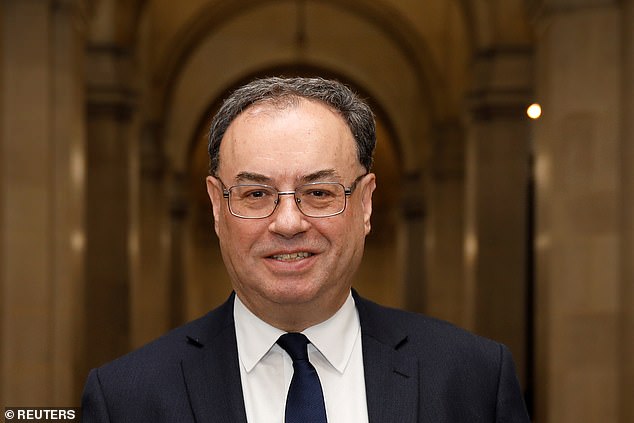ALEX BRUMMER: Bailey dips into the toolbox in a bid to get unemployment under control
As the Chancellor who dusted off long-neglected plans to give the Bank of England independence, Gordon Brown deserves to be heard.
But whether the middle of a pandemic is the right time for grand plans about changing the Bank’s remit is debateable.
The Old Lady’s response to lockdown was immediate and bears no resemblance to the financial crisis, when it was slow to cut rates and timid about quantitative easing.

Bank of England governor Andrew Bailey said he would do what it takes amid concern that the pandemic might worsen
In this crisis it cut interest rates to 0.1 per cent, added £300billion to its bond-buying programme, freed up emergency reserves at banks and dipped into commercial lending with the Covid lending facility.
Governor Andrew Bailey said he would do what it takes amid concern that the pandemic might worsen.
He has launched a study on whether the UK should follow Japan and the EU by setting negative interest rates.
In a few short months, it has moved from mildly opposed to negative rates, to agnostic to feasibility. That looks flexible but won’t win any popularity contest among commercial bankers.
Brown’s other call is for a change to the Bank’s remit so it has an employment target. This would place it more in line with the Federal Reserve in the US.
The Bank is already concerned about surging unemployment, so plotting a path to bring levels down is sensible. A jobs, as well as inflation target, could be a useful discipline.
However, to suggest that the Bank flies blind when it comes to jobs is rhetoric.
Among Mark Carney’s first acts on becoming governor in July 2013 was to set goals for reducing joblessness.
These became superfluous when the UK jobs markets took off, employment reached record levels and unemployment tanked to 3.7 per cent.
Minutes from the Monetary Policy Committee show jobs are a key factor in setting policy.
The Bank sticks with its estimate of 7.5 per cent unemployment by year end. It notes that not all the data is negative with the flow of new vacancies ticking up and notifications of new redundancies of more than 20 employees falling back.
It fears that work in the worst areas, such as air travel, could fall by a ‘greater extent that envisaged’.
The Bank has slowed quantitative easing for the moment but stands ready to increase the pace should output stumble.
That doesn’t sound like an institution neglectful of responsibility for a full-employment nation.
The Partner
John Lewis partners are feeling the pain after an unprecedented bottom-line loss of £635million over the first half of the year.
In the tradition of a new executive chairman, Sharon White has chosen to kitchen-sink closure costs, reorganisation and property values giving the department store chain opportunity to bounce back.
Along with Lord Wolfson of Next, and the Co-op, all three companies are demonstrating that there is life after lockdown.
There seems to be a strong bounce in the third (economic) quarter. In John Lewis’s case, retail parks are showing momentum, but flagship London stores, including Oxford Street, are suffering. Peter Jones, in fashionable Chelsea, is doing a better.
White is investing heavily in online capacity, but also believes there is a good case for department stores in a pandemic because shoppers can pick up all that they need from fashion to Christmas gifts in one place.
The big issue as the clock to Christmas runs down is to have confidence that there will be no further lockdowns. At John Lewis, two thirds of annual profits are earned in the holiday season.
There is optimism that Ocado’s switch of suppliers from Waitrose to Marks & Spencer doesn’t appear to have hurt, with online grocery sales up sharply since the change.
White is putting a great deal of effort into better communications with partners explaining the bonus cut but setting out criteria for future pay outs.
If White can reboot department stores as destination venues and get online working and in-stock she will demonstrate a personal leap from public to private-mutual sector can be bridged.
Brand loyalty
Could Czech energy billionaire Daniel Kretinsky be a European Warren Buffett?
Like the Sage of Omaha, he likes depleted great brands, adding a stake in Sainsbury’s to his 13.1 per cent holding in the Royal Mail.
With so much of the FTSE wounded by Covid and Brexit, he could be just what Britain needs. Dekuju!
